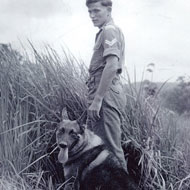Memorial to celebrate military working dogs

German shepherd Lucky worked with the Royal Air Force for three years during the Malaya Campaign.
A new memorial in Flintshire will celebrate military working dogs who have bravely served their country in both world wars and subsequent conflicts.
The planned memorial, which is the first of its kind, will feature bronzes of four heroic war dogs positioned as guardians of a central monument for service dogs working for the Royal Navy, Army and Royal Air Force.
Fundraising is being organised by the National Military Working Dogs Memorial charity (NMWDM), which was established in 2017 with the aim of gaining £150,000 in pledges.
Judy
Hero dogs surrounding the monument include Judy, a Second World War Naval mascot who spent three years as a Japanese Prisoner of War in Sumatra, where she never failed to distract guards at the camp when they beat the men. She also saved numerous people from a sinking ship by letting them hold onto her body.
The men regarded her as their guardian angel and made it their duty to protect her no matter the cost.
Theo
Explosives dog Theo, who worked with the Royal Army Veterinary Corps, was deployed to Afghanistan in 2010, where he saved countless lives by detecting bombs, weapons and improvised explosive devices that were planted by the Taliban. He found a record 14 roadside bombs and weapon caches five months into his tour of duty.
Buster
During his career as an explosives search dog with the RAF, Buster saved many lives by detecting weapons and explosives, clearing a safe passage for military personnel and civilians. He was also instrumental in apprehending insurgents, including the arrest of two suicide bombers.
Lucky
German shepherd Lucky worked with the Royal Air Force for three years during the Malaya Campaign (1948-1960). She worked with three other dogs to locate and expose insurgents hiding in the Malaya jungle. As a group, they were responsible for the capture of hundreds of communist terrorists, including notorious gang leader Lan-Jang-San, who masterminded the deaths of local innocent people.
To donate to the memorial fundraising, visit: https://nmwdm.org.uk/



 The Animal and Plant Health Agency (APHA) has updated its online reporting service for dead wild birds.
The Animal and Plant Health Agency (APHA) has updated its online reporting service for dead wild birds.